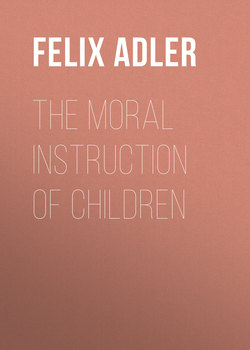The Moral Instruction of Children

Реклама. ООО «ЛитРес», ИНН: 7719571260.
Оглавление
Felix Adler. The Moral Instruction of Children
EDITOR'S PREFACE
PREFATORY NOTE
INTRODUCTORY LECTURES
I. THE PROBLEM OF UNSECTARIAN MORAL INSTRUCTION
II. THE EFFICIENT MOTIVES OF GOOD CONDUCT
III. OPPORTUNITIES FOR MORAL TRAINING IN THE DAILY SCHOOL
IV. CLASSIFICATION OF DUTIES
V. THE MORAL OUTFIT OF CHILDREN ON ENTERING SCHOOL
PRIMARY COURSE
VI. THE USE OF FAIRY TALES
VII. THE USE OF FABLES
VIII. SUPPLEMENTARY REMARKS ON FABLES
IX. STORIES FROM THE BIBLE
X. THE ODYSSEY AND THE ILIAD
GRAMMAR COURSE. LESSONS ON DUTY
XI. THE DUTY OF ACQUIRING KNOWLEDGE
XII. DUTIES WHICH RELATE TO THE PHYSICAL LIFE
XIII. DUTIES WHICH RELATE TO OTHERS
XIV. DUTIES TOWARD ALL MEN
XV. THE ELEMENTS OF CIVIC DUTY
XVI. THE USE OF PROVERBS AND SPEECHES
XVII. THE INDIVIDUALIZATION OF MORAL TEACHING
RECAPITULATION
APPENDIX. THE INFLUENCE OF MANUAL TRAINING ON CHARACTER.23
Отрывок из книги
The following lectures were delivered in the School of Applied Ethics during its first session in 1891, at Plymouth, Mass. A few of the lectures have been condensed, in order to bring more clearly into view the logical scheme which underlies the plan of instruction here outlined. The others are published substantially as delivered.
I am deeply conscious of the difficulties of the problem which I have ventured to approach, and realize that any contribution toward its solution, at the present time, must be most imperfect. I should, for my part, have preferred to wait longer before submitting my thought to teachers and parents. But I have been persuaded that even in its present shape it may be of some use. I earnestly hope that, at all events, it may serve to help on the rising tide of interest in moral education, and may stimulate to further inquiry.
.....
The topics of which moral instruction treats are the duties of life. To teach the duties, however, we must adopt some system of classification. To which system shall we give the preference? The difficulty which we encountered at the outset seems to meet us here in a new guise.
For most if not all of the systems of classification commonly proposed are based upon some metaphysical theory or some theological doctrine. To adopt any one of these would be tantamount to adopting the theory or theology on which it is founded; would be equivalent to introducing surreptitiously a particular philosophy or creed into the minds of the pupils; and this would be a plain departure from the unsectarian principle to which we are pledged. Thus, Plato's fourfold division of the virtues into the so-called cardinal virtues of temperance, courage, justice, wisdom, is based on his psychology. Aristotle's division of the virtues into dianoetic and what he calls ethical virtues is clearly dependent on what may be termed Aristotle's intellectualism – i. e., the supreme importance which he assigns to the functions of the intellect, or νοὑς [Greek: noûs], in the attainment of the perfect life.
.....